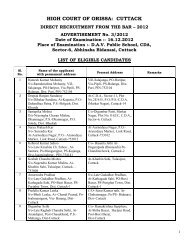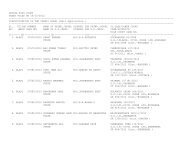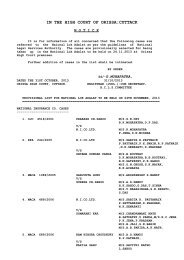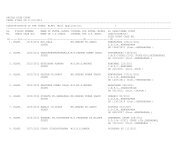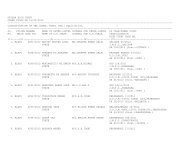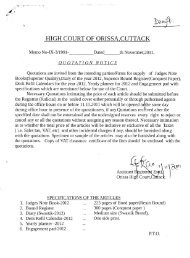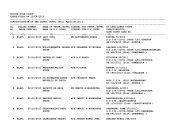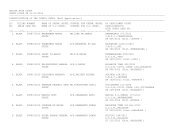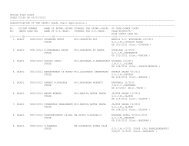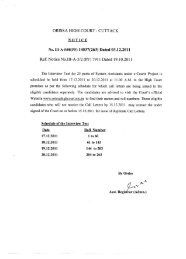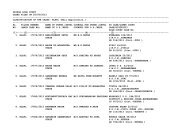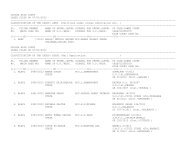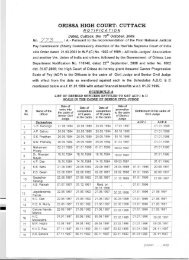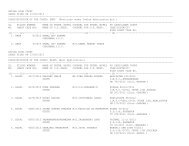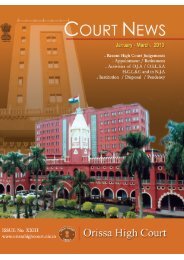ORIGINAL JURISDICTION - Orissa High Court
ORIGINAL JURISDICTION - Orissa High Court
ORIGINAL JURISDICTION - Orissa High Court
Create successful ePaper yourself
Turn your PDF publications into a flip-book with our unique Google optimized e-Paper software.
43<br />
<strong>Court</strong> in the case of M/s. Thungabhadra Industries Ltd. v. The<br />
Government of Andhra Pradesh, reported in AIR 1964 Supreme <strong>Court</strong><br />
1372. In paragraph-11 of the judgment, the apex <strong>Court</strong> defined the scope of<br />
review. The said paragraph is quoted below:<br />
K. CHANDRA MOHANTY -V- UNION OF INDIA [L.MOHAPATRA,J.]<br />
“What, however, we are now concerned with is whether the<br />
statement in the order of September 1959 that the case did not<br />
involve any substantial question of law is and ‘error apparent on the<br />
face of the record’. The fact that on the earlier occasion the court<br />
held on an identical state of facts that a substantial question of law<br />
arose would not per se conclusive, for the earlier order itself might<br />
be erroneous. Similarly, even if the statement was wrong, it would<br />
not follow that it was an ‘error apparent on the face of the record’, for<br />
there is distinction which is real, though it might not always be<br />
capable of exposition, between a mere erroneous decision and a<br />
decision which could be characterized as vitiated by ‘error apparent’.<br />
A review is by no means an appeal in disguise whereby an<br />
erroneous decision is reheard and corrected, but lies only for patent<br />
error. We do not consider that this furnishes a suitable occasion for<br />
dealing with this difference exhaustively or in any great detail, but it<br />
would suffice for us to say that where without any elaborate<br />
argument one could point to the error and say here is a substantial<br />
point of law which starts one in the face and there could reasonably<br />
be no two opinions entertained about it, a clear case of error<br />
apparent on the face of the record would be made out. No question<br />
of fact were involved in the decision of the <strong>High</strong> <strong>Court</strong> in T.R.Cs.75<br />
to 77 of 1956. The entire controversy turned on the proper<br />
interpretation of R.18(1) of the Turnover and Assessment Rules and<br />
the other pieces of legislation which are referred to by the <strong>High</strong> <strong>Court</strong><br />
in its order of February 1956; nor could it be doubted or disputed that<br />
these were substantial questions of law. In the circumstances<br />
therefore, the submission of the appellant that the order of<br />
September 1959 was vitiated by ‘error apparent’ of the kind<br />
envisaged by O. XLVII, R. I, Civil Procedure Code when it stated that<br />
‘no substantial question of law arose’ appears to us to be clearly well<br />
founded. Indeed, learned Counsel for the respondent did not seek to<br />
argue that the earlier order of September 1959 was not vitiated by<br />
such error.”<br />
In the case of M/s. Northern India Caterers (India) Ltd. v. Lt.<br />
Governor of Delhi, reported in AIR 1980 Supreme <strong>Court</strong> 674. The<br />
Hon’ble Supreme <strong>Court</strong> observed that a party is not entitled to seek a review<br />
of a judgment delivered by the Supreme <strong>Court</strong> merely for the purpose of a



